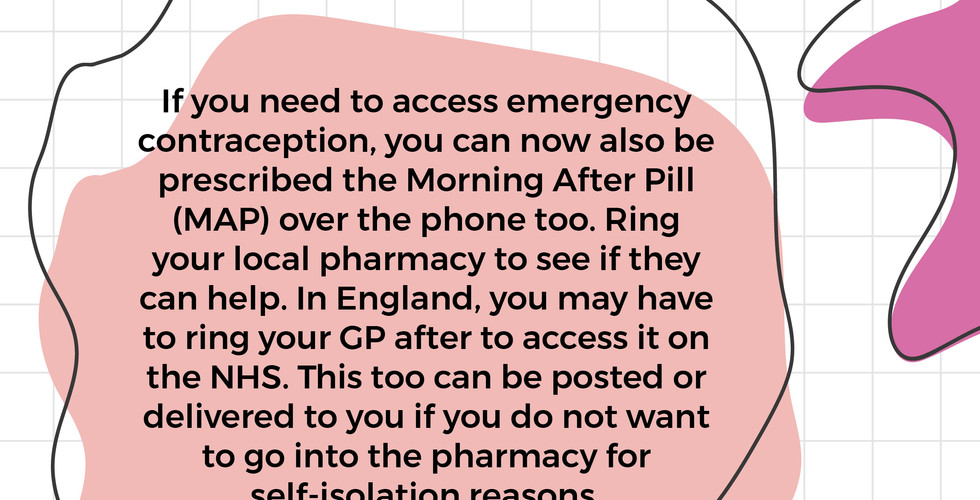If you’re a contraceptive user, you may be worried about how social distancing and unprecedented pressure on the NHS will affect your ability to access contraception.
Here at CERT, we have put together this handy guide on how you can continue to access different forms of contraception and what has changed due to the pandemic.
Swipe through to learn more about how to access contraception during Covid 19
The most important thing to say is that your sexual and reproductive health does not become less important during this - if anything, their time-sensitive nature means delaying reaching out can cause problems. So, here’s how you can continue to access your usual sexual health services in these unprecedented times.
Consultations that you would normally have with your GP are now being done over the phone or via video-calling where possible. If you are being prescribed the pill (both combined and progesterone-only), you can either pick it up in your local pharmacy or have it posted to you.
If you use the combined pill, your GP can now prescribe you a further 6-12 months’ supply over the phone so long as they have measured your blood pressure and BMI in the past 12 months. If they have not, you may be asked to take your own measurements if you can - and if you cannot you can speak to your pharmacist who may be able to help.
If you need to access emergency contraception, you can now also be prescribed the Morning After Pill (MAP) over the phone too. Ring your local pharmacy to see if they can help. In England, you may have to ring your GP after to access it on the NHS. This too can be posted or delivered to you if you do not want to go into the pharmacy for self-isolation reasons.
If you decide you would rather have an IUD fitted as a form of emergency contraception, this too can now be arranged over the phone and your pharmacist or GP will refer you to a local sexual health clinic as normal.
Those that currently have Long Acting Reversible Contraceptives (LARCs) fitted such as the implant and IUDs are being advised that they can be kept in for longer (up to 12 years in the case of some copper IUDs). However, if you are worried that your LARC has been in for too long to be effective, ring your GP and they can supplement it with the mini-pill - although the risk of pregnancy is low either way. Non-emergency LARC removals are generally being postponed until after the Coronavirus epidemic dies down.
GPs and sexual health clinics are continuing to treat possible serious side effects from contraceptive use (such as pelvic pain and unexpected bleeding) so phone your GP if you experience any of these.
The availability of free condoms via the C-Card scheme is reliant on local distribution points remaining open. So, you can likely still pick them up from pharmacies but it would be worth checking online to see where is still open. It also might be a good idea to ring ahead and see if there are alternative ways this is operating locally such as receiving them in the post or via delivery to minimise social contact.
Many sexual health clinics (including Chalmers in Edinburgh) are no longer accepting walk-ins or giving STD tests to people without symptoms so check the websites of your local clinics.
In the event you need (or are considering) an abortion, ring your GP who will refer you to local abortion providers. Many of these are using phone and video consultations where possible but the law means that a face to face appointment is often needed. They are also being advised to use medical abortions where possible as surgical abortions require an anaethatist being present. Also, in England, the second abortion pill must still be taken onsite (rather than at home) for legal reasons.
So, steps are being taken by medical professionals to ensure social distancing is happening when you access contraception. This is to make sure your risk of catching or passing the coronavirus on is kept as low as possible whilst still offering as high quality care as possible. However, there is more that can and needs to be done. The Faculty of Sexual and Reproductive Health (FSRH) have made four key recommendations during this period of social distancing:
1. The development of an online hub for non-urgent contraceptive needs like routine prescribing that would allow a completely contact-free way to access contraception and take up less time for medical professionals.
2. Changing the law (the Medicines Act) to allow the mini pill to be prescribed by pharmacists - rather than GPs. This is especially true for short term emergencies when it can be used if other methods are harder to come by.
3. Allow people to take the second abortion pill (mifepristone) at home across the UK. This is currently only allowed in Scotland and Wales - in England, it has to be taken in a clinic. The Department for Health published a document on 23rd March seemingly outlining this change only to retract it hours later. MPs like Jess Phillips and Stella Creasy are lobbying the government to stand by their original position.
4. Pharmacies should be allowed to prescribe 3 months’ worth of the pill in an emergency. They are currently only allowed to prescribe one month’s worth.
We at CERT wholeheartedly support these changes as we think they’ll help deliver quality contraceptive care for all no matter the circumstances. If you agree then please share this and email your local MP using this link: https://bpas.eaction.org.uk/covid2sigs/
Information sourced from:

















Comments